北师大版英语必修五Unit 13 People lesson3
文档属性
| 名称 | 北师大版英语必修五Unit 13 People lesson3 |
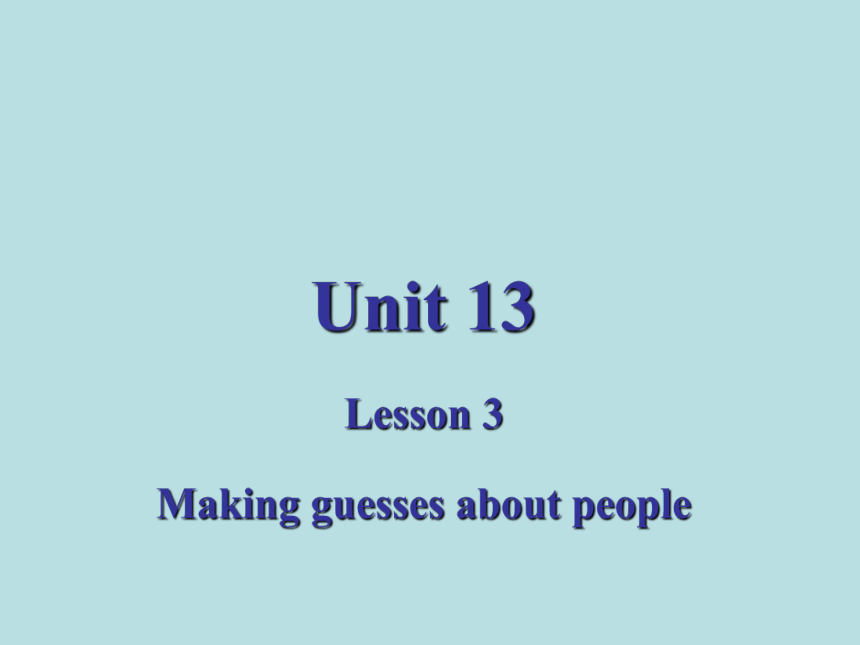
|
|
| 格式 | zip | ||
| 文件大小 | 826.8KB | ||
| 资源类型 | 教案 | ||
| 版本资源 | 北师大版 | ||
| 科目 | 英语 | ||
| 更新时间 | 2012-03-05 00:00:00 | ||
图片预览

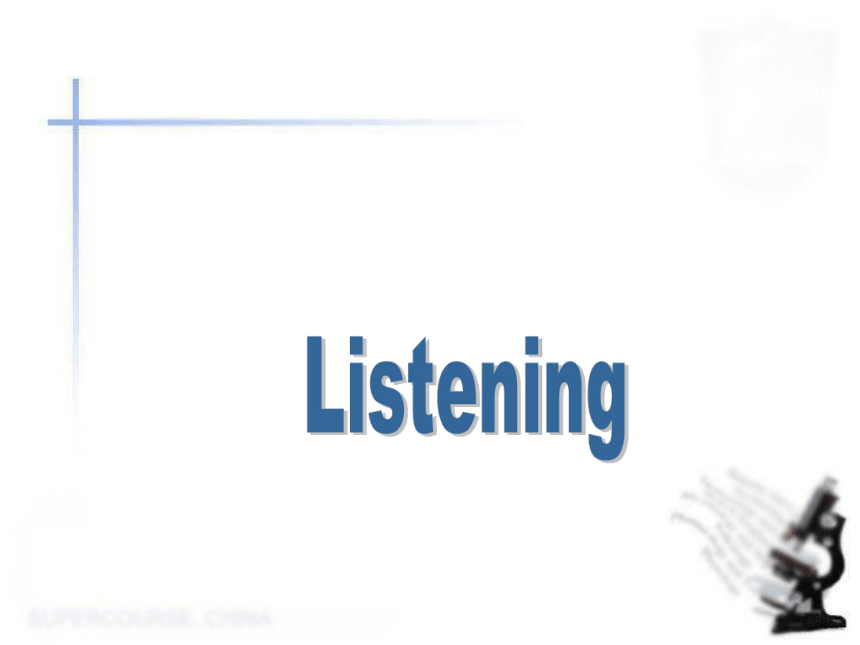

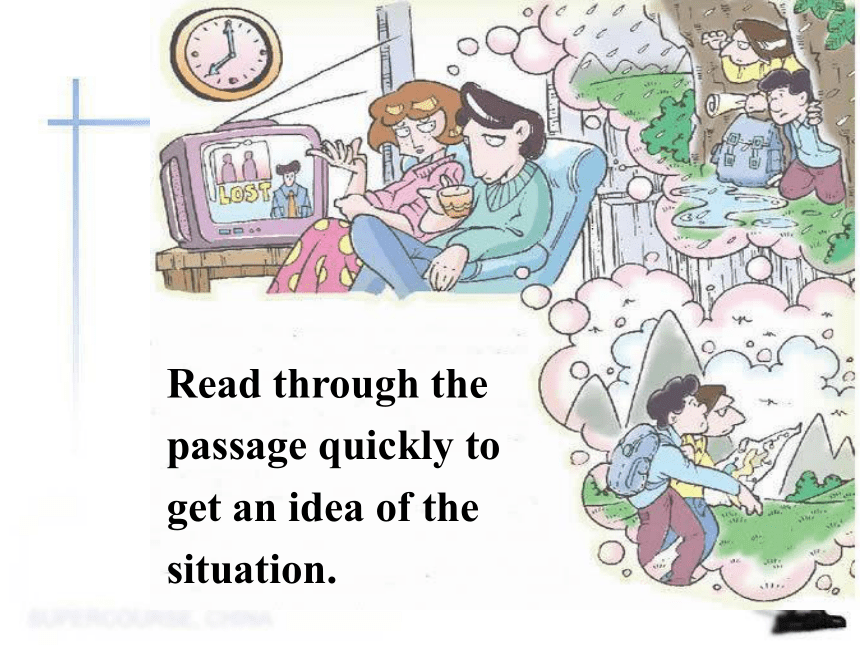
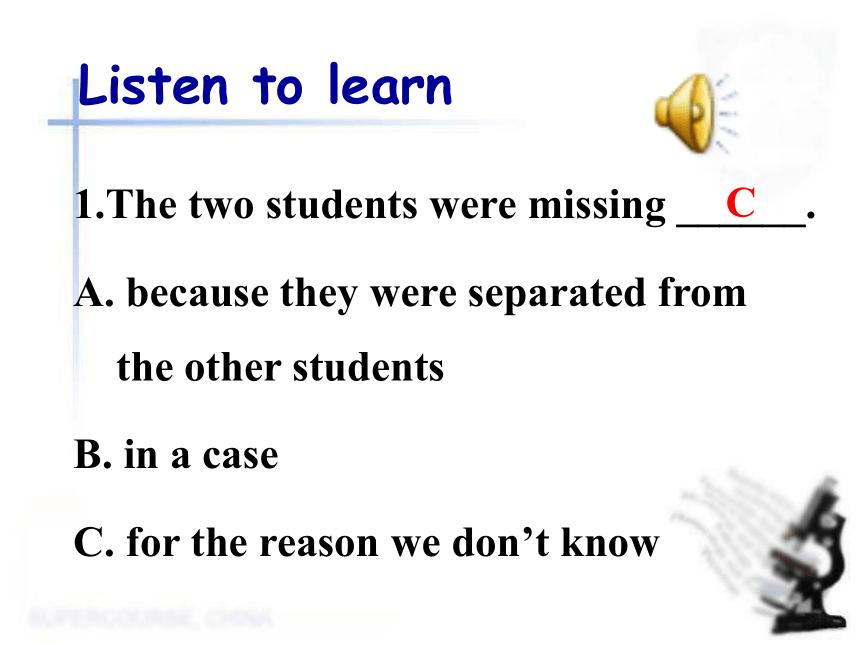
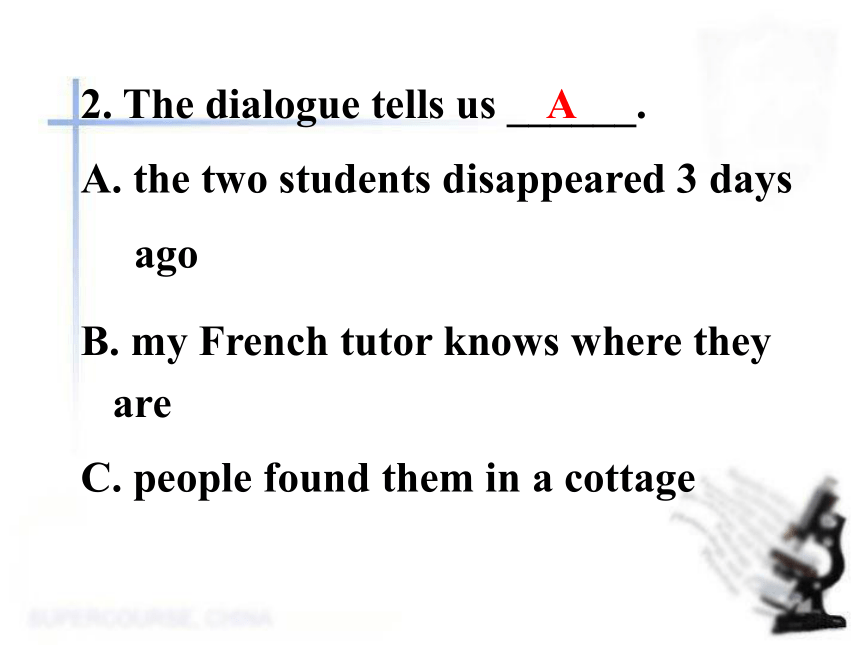
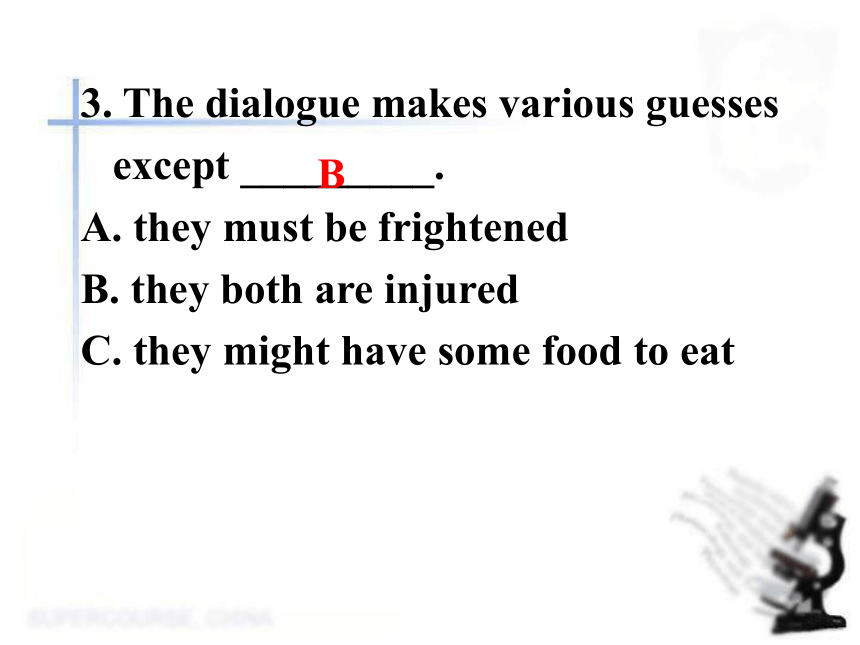


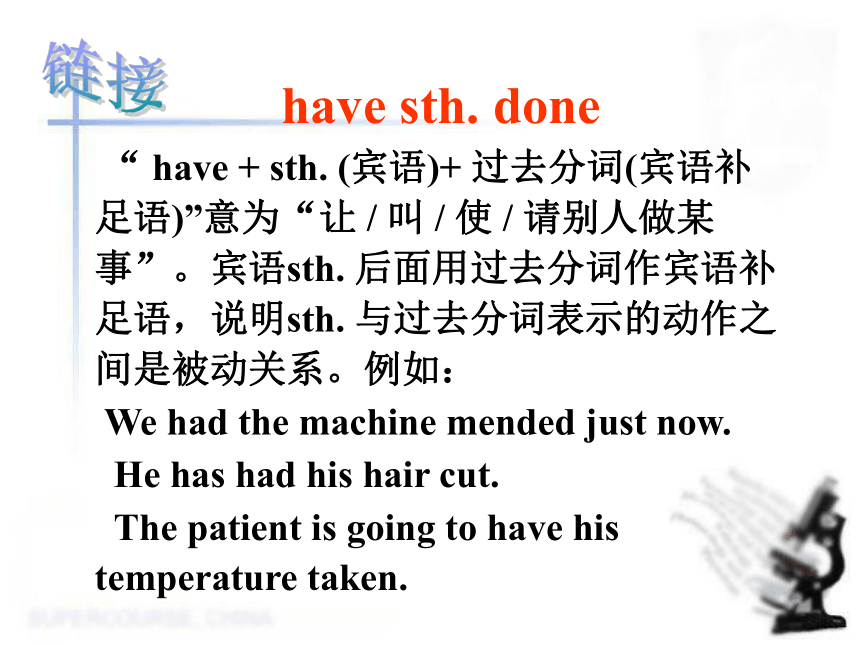
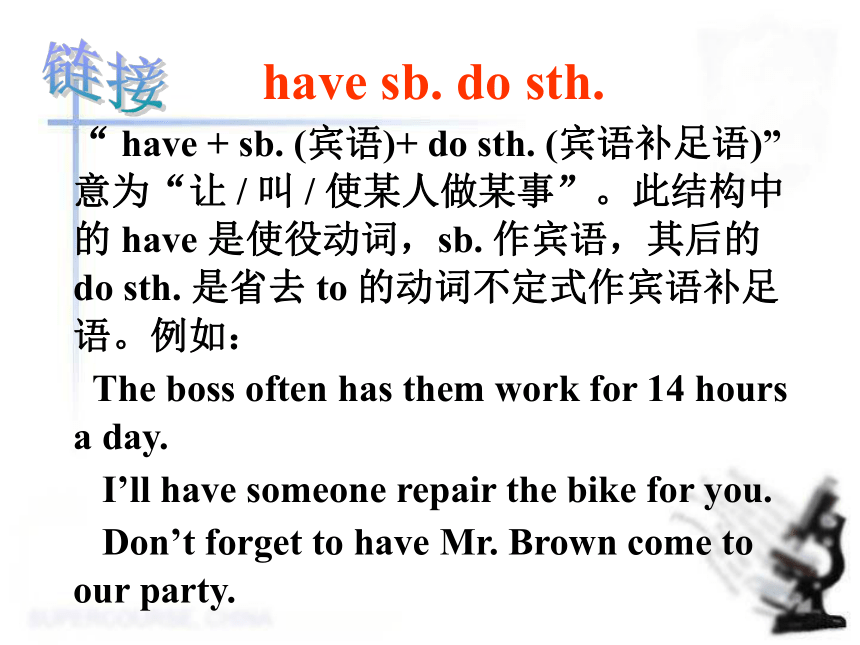
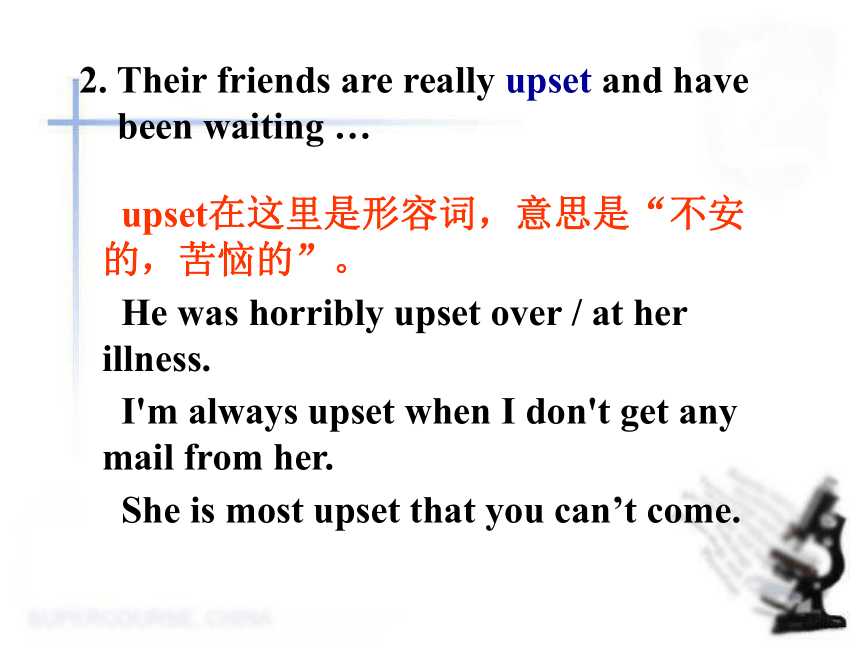
文档简介
(共55张PPT)
Unit 13
Lesson 3
Making guesses about people
Do you often watch news on TV
Which part of the TV news are you most interested in
Read through the passage quickly to get an idea of the situation.
Listen to learn
The two students were missing ______.
because they were separated from
the other students
B. in a case
C. for the reason we don’t know
C
2. The dialogue tells us ______.
A. the two students disappeared 3 days
ago
B. my French tutor knows where they are
C. people found them in a cottage
A
3. The dialogue makes various guesses except _________.
they must be frightened
they both are injured
they might have some food to eat
B
Can you say out the main idea of the story in your own words
Language points
I saw she had tears running down her
cheeks at lunch …
have sb. / sth. doing 意思是“使某人/物一直处于某种状态”。
Don’t have the baby crying!
Don’t have the dog barking much.
You’d better have your car running slowly.
have sth. done
“ have + sth. (宾语)+ 过去分词(宾语补足语)”意为“让 / 叫 / 使 / 请别人做某事”。宾语sth. 后面用过去分词作宾语补足语,说明sth. 与过去分词表示的动作之间是被动关系。例如:
We had the machine mended just now.
He has had his hair cut.
The patient is going to have his temperature taken.
have sb. do sth.
“ have + sb. (宾语)+ do sth. (宾语补足语)”意为“让 / 叫 / 使某人做某事”。此结构中的 have 是使役动词,sb. 作宾语,其后的 do sth. 是省去 to 的动词不定式作宾语补足语。例如:
The boss often has them work for 14 hours a day.
I’ll have someone repair the bike for you.
Don’t forget to have Mr. Brown come to our party.
2. Their friends are really upset and have
been waiting …
upset在这里是形容词,意思是“不安的,苦恼的”。
He was horribly upset over / at her illness.
I'm always upset when I don't get any mail from her.
She is most upset that you can’t come.
upset还可作动词,意思是“使心烦意乱;打翻;翻倒;打乱”。
Losing the necklace borrowed from her friend upset her completely.
The news quite upset him.
He upset a bottle of ink.
The boat will upset if a storm breaks.
Rain upset our plans for a picnic.
3. I wonder how they got lost and whose
fault it was.
fault n. 缺点,毛病, 缺陷
Every man has his faults.
One of my faults is that I’m always late.
It was not our fault that we were late.
My father is always finding fault with the way I do things.
error,fault,mistake,shortcoming
这些名词均有“错误”或“缺点”之意。
error指思想或行动背离正题轨道或没有得到正确指引而出现的偏差或错误。
The accident was caused by human error.
fault一般指小并且可宽容的缺点、错误。
I like him despite his faults.
mistake最普通用词,泛指思想上、行为上或认识上的判断或理解方面的错误。
It was a mistake to tell him.
shortcoming指没有达到所要求的标准、没有充分发展或没尽到职责的不足、缺点或短处。多用复数形式。
No matter who point out our shortcoming, we will correct them.
4. …, or they might have fallen behind
and taken the wrong path.
fall behind 落在...后面
He is afraid of falling behind the others.
France has fallen behind (Germany) in coal production.
fall的常见短语:
fall asleep 睡着 fall off 跌落, 下降
fall into 落入,分成 fall apart 崩溃,瓦解
5. Or they could be in one of those empty
cottages near the pine trees right at the
top of the mountain.
right在这里是副词,用来修饰动词、副词或作状语的介词短语等, 表示“正好;就是”之意。
The police looked at the thief right in the eye.
Your glasses are right here on the table.
6. And one of them might be bleeding or
have a broken arm or leg.
bleed v. 出血, 流血
He was bleeding badly.
All the young soldiers are ready to bleed for the country.
My heart bleeds for you.
blood n. 血
7. It’ll be a real relief when they’re found.
relief n. (痛苦,负担等的)缓和,减轻;解除;
轻松,宽心,慰藉
The pills gave her some relief.
It is a great relief to have rain after a long time of drought.
We all breathed a sigh of relief when we heard that they were safe.
comfort, ease, leisure, relaxation, relief, rest这些名词均含“舒适,安逸、悠闲”之意。
comfort: 通常指在摆脱烦人、痛苦的事情,或在要求、愿望得到满足后所感到的舒适。
First, you need to get out of your comfort zone.
ease: 指因没有担心和忧虑而轻松。
My parents are retired and now live a life of ease.
leisure: 专指闲暇时间或悠闲状态。
I have no leisure for playing cards.
relaxation: 强调消除肌肉疲劳或思想的紧张状态,使身心松弛,得到休息。
His day is evenly divided between work and relaxation.
rest: 与work相对,强调消除身心疲劳,不着重休息的方式。
You look tired. You need a good rest.
Watch out! There’s a lot of b______ glass
on the floor.
2. To my great r________, she wasn’t badly hurt.
3. She burst into t_______ at the terrible
news.
4. A lot of ships s_______ from the storm in the harbour.
5. Don’t blame me; it’s not my f______
that we missed the train.
Complete the sentences with the correct words.
broken
relief
tears
sheltered
fault
6. Mom was _______(不快的) because my
sister hadn’t come back for the Spring
Festival. 7. When I was in Africa, my heart _____ (流血) for the poor children I saw. 8. Do you know Professor White He was my _____ (导师) in college. 9. Yu Qiuyu is considered one of the
greatest _______ (学者). 10. She gave her son a ______ (拥抱) and
put him to bed.
upset
bled
tutor
scholars
hug
When we watch a serial play on TV, we often want to know what will happen next or how it will end. Which words do you use to express guesses
I think my French tutor might know
one of them.
2. They must be so frightened!
3. They may have been separated from
the other students and …
4. … or they might have fallen behind
and taken the wrong path.
Listen again and pay attention to the
following sentences.
5. Or they could have gone exploring on
their own and lost their way back to
the group.
6. They must be freezing!
7. They might be sheltering in a cave.
8. Or they could be in one of those
empty cottages near the pine trees
right at the top of the mountain.
9. They can’t be there. People would
have looked there first, I’m sure.
10. They can’t exactly eat seeds like
aquarelles and sparrows do!
11. They might have some food left
from camping but they may not have
any water.
12. And one of them might be bleeding
or have a broken arm or leg.
13. Their parents must be very worried.
Modals for guessing
may
must
can
can’t
might
can, could, may, might, must
表示推测的用法 1. “情态动词+动词原形”表示对现在或将来
的情况的推测。 I don’t know where she is, she may be in Wuhan.
2. “情态动词+动词现在进行时”表示对现在
或将来正在进行的情况进行推测。 At this moment, our teacher might be correcting our exam papers.
3. “情态动词+现在完成时”表示对过去情况的推测。
Nobody have ever seen him since that year. He may/might have gone abroad.
4. “情态动词+动词的现在完成进行时”表示对过去正在发生事情的推测。
Your mother may have been looking for you.
5. can和could表示推测的时候,通常只用于疑问句和否定句。
Mike can’t have found his car, for he came to work by bus this morning.
----Where can he have gone
---- He couldn’t have gone to school. It’s Sunday.
注意:
如果按照推测的肯定程度来区别,must
的程度时最肯定的,接着是can, may。could和might不表示过去时态,只是推测的肯定语气比较弱。
2. 表示“一定不可能”不用mustn’t,而是can’t。
must表示推测的用法 must只用于肯定句,表示较有把握的推测,意为“一定”。
must表对现在的状态或现在正发生的事情的推测,must 后面通常接动词原形。 You have worked hard all day. You must be tired.
2. must表示对现在正发生的事情的推测时,must 后面通常接进行时。 He must be working in his office now.
3. must 表示对已发生的事情的推测时,must 要接现在完成时。 I didn’t hear the phone. I must have been asleep.
4. must表示对过去某时正发生的事情的推测,must 后面要接完成进行式。
He must have been driving very fast when the accident happened.
1. The room is in a terrible mess; it _____ cleaned.
A. can’t have been
B. shouldn’t have been
C. mustn’t have been
D. wouldn’t have been
can和could通常用于否定句或疑问句
中,may、 might和must用于肯定句中。
这句话是否定的猜测,因此只能选A。
Example
2. You _____ her in her office last Friday; she’s been out of town for two weeks.
A. needn’t have seen
B. must have seen
C. might have seen
D. can’t have seen
根据句意“她去外地已有两星期了”,说
明她上周五是不在的,因此可以很肯定
地推断不可能在办公室见到她。
D
3. Mary’s score on the test is the highest in her class, she ____ have studied very hard.
A. may B. should
C. must D. ought to
根据句意“考试成绩全班第一”,因此
用must表示很肯定的推测, 意思是“一
定”。
C
Try to guess what happened in the past.
A young woman is looking at a new
ring on her finger.
She might have got engaged recently.
2. A mother is telling her son off.
He might have come home late.
3. A boy has a broken arm.
4. There is a lot of broken glass on the
street.
5. A man is lying asleep on a park
bench.
He may have fallen out of a tree.
There might have been an accident.
He might be drunk.
6. A housewife is cheering.
7. A driver is taking a set of tools
from the car.
8. A girl with wet hair is traveling on
the bus.
Her husband may be cleaning the house.
His car must have broken down.
She might have been swimming.
Rewrite the sentences using modal verbs and suitable verb forms may be more than one correct answer.
I’m sure she’s relaxing in her room.
She _______________ in her room.
must be relaxing
2. Perhaps the postcode was wrong,
and that’s why the letter never
arrived.
The postcode ________________ wrong , and that’s why the letter never arrived.
may/might /could have been
3. I don’t believe you failed the exam.
You _______________ the exam.
can’t have failed
4. It’s possible that Sam doesn’t like
classical music.
Sam ____________ classical music.
5. I’m sure John is not forty- five yet.
John _______ forty – five yet.
might not like
can’t be
6. It is possible that he’s studying
astronomy now.
He _____________ astronomy now.
7. Maybe they lied to me about their
adventure.
They ______________ to me about
their adventure.
may be studying
might have lied
8. It’s quite probable that Bill didn’t win
the competition.
Bill _________________ the competition.
might not have won
—Do you know where David is I
couldn’t find him anywhere.
--Well. He _____have gone far, for his coat is still here.
shouldn’t B. mustn’t
C. can’t D. wouldn’t
C. can’t
Best Choice
2. ---Excuse me. Is this the right way
to the Summer Palace
---Sorry, I am not sure. But it _____be .
A. might B. will
C. must D. can
A. might
3. ---Tom graduated from college at
a very young age.
--- Oh, he _____have been a very
smart boy then.
A. could B. should
C. might D. must
D. must
4.----I heard they went skiing in the
mountains last winter.
---- It ____ true because there was
little snow there.
A. may not be B. won’t be
C. couldn’t be D. mustn’t be
C. couldn’t be
5. Jack ______ yet, otherwise he would
have telephoned me.
A. mustn’t have arrived
B. shouldn’t have arrived
C. can’t have arrived
D. needn’t have arrived
C. can’t have arrived
6. ---Didn’t you know that you went
driving at 100 kilometers an
hour, Madam
--- _____. My old car can do no
more than 80, officer.
I may not have been
I couldn’t have been
I mustn’t have been
I shouldn’t have been
B.I couldn’t have been
Finish exercises 10 and 11 in
Language in Use.
2. Review Grammar Summary about Modals for Guessing on P 92.
Unit 13
Lesson 3
Making guesses about people
Do you often watch news on TV
Which part of the TV news are you most interested in
Read through the passage quickly to get an idea of the situation.
Listen to learn
The two students were missing ______.
because they were separated from
the other students
B. in a case
C. for the reason we don’t know
C
2. The dialogue tells us ______.
A. the two students disappeared 3 days
ago
B. my French tutor knows where they are
C. people found them in a cottage
A
3. The dialogue makes various guesses except _________.
they must be frightened
they both are injured
they might have some food to eat
B
Can you say out the main idea of the story in your own words
Language points
I saw she had tears running down her
cheeks at lunch …
have sb. / sth. doing 意思是“使某人/物一直处于某种状态”。
Don’t have the baby crying!
Don’t have the dog barking much.
You’d better have your car running slowly.
have sth. done
“ have + sth. (宾语)+ 过去分词(宾语补足语)”意为“让 / 叫 / 使 / 请别人做某事”。宾语sth. 后面用过去分词作宾语补足语,说明sth. 与过去分词表示的动作之间是被动关系。例如:
We had the machine mended just now.
He has had his hair cut.
The patient is going to have his temperature taken.
have sb. do sth.
“ have + sb. (宾语)+ do sth. (宾语补足语)”意为“让 / 叫 / 使某人做某事”。此结构中的 have 是使役动词,sb. 作宾语,其后的 do sth. 是省去 to 的动词不定式作宾语补足语。例如:
The boss often has them work for 14 hours a day.
I’ll have someone repair the bike for you.
Don’t forget to have Mr. Brown come to our party.
2. Their friends are really upset and have
been waiting …
upset在这里是形容词,意思是“不安的,苦恼的”。
He was horribly upset over / at her illness.
I'm always upset when I don't get any mail from her.
She is most upset that you can’t come.
upset还可作动词,意思是“使心烦意乱;打翻;翻倒;打乱”。
Losing the necklace borrowed from her friend upset her completely.
The news quite upset him.
He upset a bottle of ink.
The boat will upset if a storm breaks.
Rain upset our plans for a picnic.
3. I wonder how they got lost and whose
fault it was.
fault n. 缺点,毛病, 缺陷
Every man has his faults.
One of my faults is that I’m always late.
It was not our fault that we were late.
My father is always finding fault with the way I do things.
error,fault,mistake,shortcoming
这些名词均有“错误”或“缺点”之意。
error指思想或行动背离正题轨道或没有得到正确指引而出现的偏差或错误。
The accident was caused by human error.
fault一般指小并且可宽容的缺点、错误。
I like him despite his faults.
mistake最普通用词,泛指思想上、行为上或认识上的判断或理解方面的错误。
It was a mistake to tell him.
shortcoming指没有达到所要求的标准、没有充分发展或没尽到职责的不足、缺点或短处。多用复数形式。
No matter who point out our shortcoming, we will correct them.
4. …, or they might have fallen behind
and taken the wrong path.
fall behind 落在...后面
He is afraid of falling behind the others.
France has fallen behind (Germany) in coal production.
fall的常见短语:
fall asleep 睡着 fall off 跌落, 下降
fall into 落入,分成 fall apart 崩溃,瓦解
5. Or they could be in one of those empty
cottages near the pine trees right at the
top of the mountain.
right在这里是副词,用来修饰动词、副词或作状语的介词短语等, 表示“正好;就是”之意。
The police looked at the thief right in the eye.
Your glasses are right here on the table.
6. And one of them might be bleeding or
have a broken arm or leg.
bleed v. 出血, 流血
He was bleeding badly.
All the young soldiers are ready to bleed for the country.
My heart bleeds for you.
blood n. 血
7. It’ll be a real relief when they’re found.
relief n. (痛苦,负担等的)缓和,减轻;解除;
轻松,宽心,慰藉
The pills gave her some relief.
It is a great relief to have rain after a long time of drought.
We all breathed a sigh of relief when we heard that they were safe.
comfort, ease, leisure, relaxation, relief, rest这些名词均含“舒适,安逸、悠闲”之意。
comfort: 通常指在摆脱烦人、痛苦的事情,或在要求、愿望得到满足后所感到的舒适。
First, you need to get out of your comfort zone.
ease: 指因没有担心和忧虑而轻松。
My parents are retired and now live a life of ease.
leisure: 专指闲暇时间或悠闲状态。
I have no leisure for playing cards.
relaxation: 强调消除肌肉疲劳或思想的紧张状态,使身心松弛,得到休息。
His day is evenly divided between work and relaxation.
rest: 与work相对,强调消除身心疲劳,不着重休息的方式。
You look tired. You need a good rest.
Watch out! There’s a lot of b______ glass
on the floor.
2. To my great r________, she wasn’t badly hurt.
3. She burst into t_______ at the terrible
news.
4. A lot of ships s_______ from the storm in the harbour.
5. Don’t blame me; it’s not my f______
that we missed the train.
Complete the sentences with the correct words.
broken
relief
tears
sheltered
fault
6. Mom was _______(不快的) because my
sister hadn’t come back for the Spring
Festival. 7. When I was in Africa, my heart _____ (流血) for the poor children I saw. 8. Do you know Professor White He was my _____ (导师) in college. 9. Yu Qiuyu is considered one of the
greatest _______ (学者). 10. She gave her son a ______ (拥抱) and
put him to bed.
upset
bled
tutor
scholars
hug
When we watch a serial play on TV, we often want to know what will happen next or how it will end. Which words do you use to express guesses
I think my French tutor might know
one of them.
2. They must be so frightened!
3. They may have been separated from
the other students and …
4. … or they might have fallen behind
and taken the wrong path.
Listen again and pay attention to the
following sentences.
5. Or they could have gone exploring on
their own and lost their way back to
the group.
6. They must be freezing!
7. They might be sheltering in a cave.
8. Or they could be in one of those
empty cottages near the pine trees
right at the top of the mountain.
9. They can’t be there. People would
have looked there first, I’m sure.
10. They can’t exactly eat seeds like
aquarelles and sparrows do!
11. They might have some food left
from camping but they may not have
any water.
12. And one of them might be bleeding
or have a broken arm or leg.
13. Their parents must be very worried.
Modals for guessing
may
must
can
can’t
might
can, could, may, might, must
表示推测的用法 1. “情态动词+动词原形”表示对现在或将来
的情况的推测。 I don’t know where she is, she may be in Wuhan.
2. “情态动词+动词现在进行时”表示对现在
或将来正在进行的情况进行推测。 At this moment, our teacher might be correcting our exam papers.
3. “情态动词+现在完成时”表示对过去情况的推测。
Nobody have ever seen him since that year. He may/might have gone abroad.
4. “情态动词+动词的现在完成进行时”表示对过去正在发生事情的推测。
Your mother may have been looking for you.
5. can和could表示推测的时候,通常只用于疑问句和否定句。
Mike can’t have found his car, for he came to work by bus this morning.
----Where can he have gone
---- He couldn’t have gone to school. It’s Sunday.
注意:
如果按照推测的肯定程度来区别,must
的程度时最肯定的,接着是can, may。could和might不表示过去时态,只是推测的肯定语气比较弱。
2. 表示“一定不可能”不用mustn’t,而是can’t。
must表示推测的用法 must只用于肯定句,表示较有把握的推测,意为“一定”。
must表对现在的状态或现在正发生的事情的推测,must 后面通常接动词原形。 You have worked hard all day. You must be tired.
2. must表示对现在正发生的事情的推测时,must 后面通常接进行时。 He must be working in his office now.
3. must 表示对已发生的事情的推测时,must 要接现在完成时。 I didn’t hear the phone. I must have been asleep.
4. must表示对过去某时正发生的事情的推测,must 后面要接完成进行式。
He must have been driving very fast when the accident happened.
1. The room is in a terrible mess; it _____ cleaned.
A. can’t have been
B. shouldn’t have been
C. mustn’t have been
D. wouldn’t have been
can和could通常用于否定句或疑问句
中,may、 might和must用于肯定句中。
这句话是否定的猜测,因此只能选A。
Example
2. You _____ her in her office last Friday; she’s been out of town for two weeks.
A. needn’t have seen
B. must have seen
C. might have seen
D. can’t have seen
根据句意“她去外地已有两星期了”,说
明她上周五是不在的,因此可以很肯定
地推断不可能在办公室见到她。
D
3. Mary’s score on the test is the highest in her class, she ____ have studied very hard.
A. may B. should
C. must D. ought to
根据句意“考试成绩全班第一”,因此
用must表示很肯定的推测, 意思是“一
定”。
C
Try to guess what happened in the past.
A young woman is looking at a new
ring on her finger.
She might have got engaged recently.
2. A mother is telling her son off.
He might have come home late.
3. A boy has a broken arm.
4. There is a lot of broken glass on the
street.
5. A man is lying asleep on a park
bench.
He may have fallen out of a tree.
There might have been an accident.
He might be drunk.
6. A housewife is cheering.
7. A driver is taking a set of tools
from the car.
8. A girl with wet hair is traveling on
the bus.
Her husband may be cleaning the house.
His car must have broken down.
She might have been swimming.
Rewrite the sentences using modal verbs and suitable verb forms may be more than one correct answer.
I’m sure she’s relaxing in her room.
She _______________ in her room.
must be relaxing
2. Perhaps the postcode was wrong,
and that’s why the letter never
arrived.
The postcode ________________ wrong , and that’s why the letter never arrived.
may/might /could have been
3. I don’t believe you failed the exam.
You _______________ the exam.
can’t have failed
4. It’s possible that Sam doesn’t like
classical music.
Sam ____________ classical music.
5. I’m sure John is not forty- five yet.
John _______ forty – five yet.
might not like
can’t be
6. It is possible that he’s studying
astronomy now.
He _____________ astronomy now.
7. Maybe they lied to me about their
adventure.
They ______________ to me about
their adventure.
may be studying
might have lied
8. It’s quite probable that Bill didn’t win
the competition.
Bill _________________ the competition.
might not have won
—Do you know where David is I
couldn’t find him anywhere.
--Well. He _____have gone far, for his coat is still here.
shouldn’t B. mustn’t
C. can’t D. wouldn’t
C. can’t
Best Choice
2. ---Excuse me. Is this the right way
to the Summer Palace
---Sorry, I am not sure. But it _____be .
A. might B. will
C. must D. can
A. might
3. ---Tom graduated from college at
a very young age.
--- Oh, he _____have been a very
smart boy then.
A. could B. should
C. might D. must
D. must
4.----I heard they went skiing in the
mountains last winter.
---- It ____ true because there was
little snow there.
A. may not be B. won’t be
C. couldn’t be D. mustn’t be
C. couldn’t be
5. Jack ______ yet, otherwise he would
have telephoned me.
A. mustn’t have arrived
B. shouldn’t have arrived
C. can’t have arrived
D. needn’t have arrived
C. can’t have arrived
6. ---Didn’t you know that you went
driving at 100 kilometers an
hour, Madam
--- _____. My old car can do no
more than 80, officer.
I may not have been
I couldn’t have been
I mustn’t have been
I shouldn’t have been
B.I couldn’t have been
Finish exercises 10 and 11 in
Language in Use.
2. Review Grammar Summary about Modals for Guessing on P 92.
